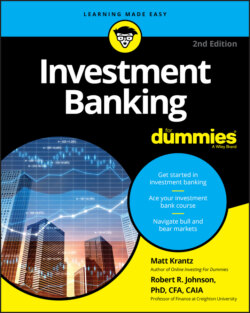Читать книгу Investment Banking For Dummies - Matthew Krantz - Страница 53
What matters in an IPO
ОглавлениеUnderwriters stay involved in the process during this tenuous first day of trading. Investment banks want to do whatever they can to make sure the shares of the newly public company don’t break (close below the initial price). A broken deal is often looked at negatively by investors; plus, a broken deal makes it look like the investment bank didn’t set the initial price correctly.
Investment bankers try to balance the needs and wants of the buyers and sellers. If the price of the IPO zooms upward, the investors who sold their shares may feel like they were shortchanged and missed out on gains. However, if the price drops after the stock starts trading, the buyers may feel cheated and avoid that investment banking firm’s deal in the future. There’s also a risk that if an investment bank prices shares too high, it might need to step in and buy the shares to stop them from falling too much. On the first day of trading of Internet stock Facebook in May 2012, for instance, underwriters had to step up and buy to hold the stock from closing below the $38-per-share offering price.
Lastly, several months after the IPO has been trading, the investment bank’s research unit will initiate coverage on the new stock. A research analyst at the bank will write a report describing the company and the stocks, advising the investment bank’s clients on whether to invest in the new stock. This investment research capability of investment banks is covered in the next section as well as in Chapter 3 in greater detail.
